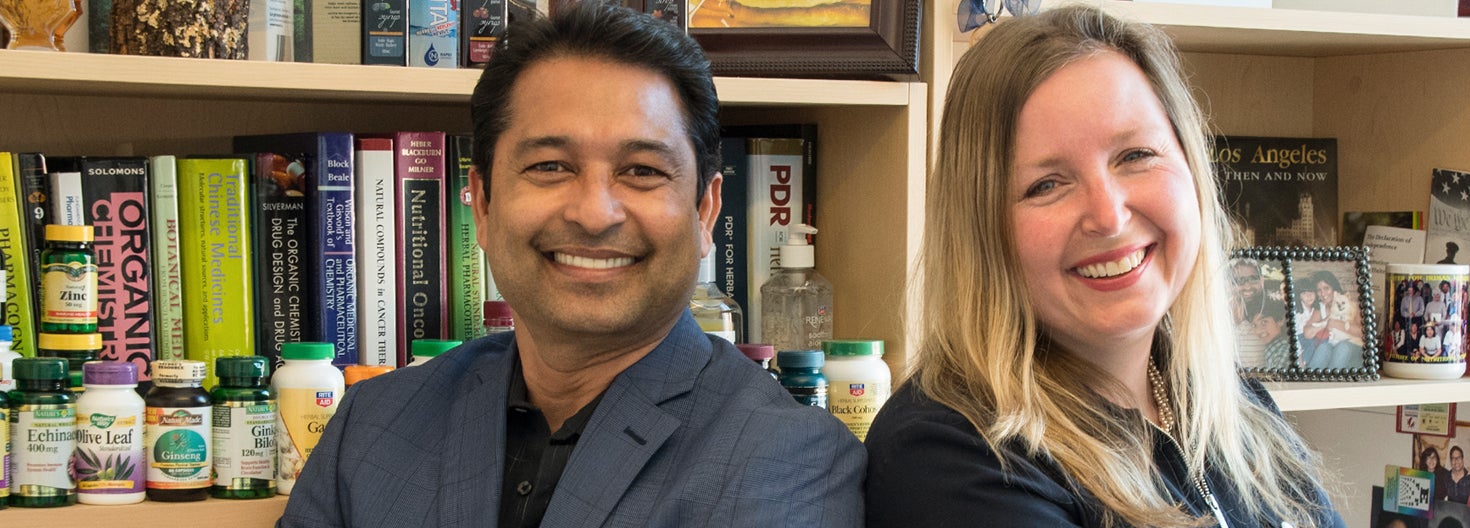
Navindra Seeram and Angela Slitt, associate professors of biomedical and pharmaceutical sciences in URI’s College of Pharmacy, have received federal funding to further study the anti-inflammatory properties of maple syrup.
When you hear “maple syrup,” chances are you think about pancakes. But for two College of Pharmacy faculty members, the focus—and their research— is on maple syrup’s health benefits.
Navindra Seeram and Angela Slitt, associate professors of biomedical and pharmaceutical sciences, conduct pioneering work exploring the anti-inflammatory properties of maple syrup phytochemicals. Seeram is also an associate professor of research at URI’s George & Anne Ryan Institute for Neuroscience.
Inflammation is a risk factor for chronic conditions such as diabetes, heart disease, and Alzheimer’s. Maple syrup contains dozens of compounds, called polyphenols, that have been found to have anti-inflammatory properties.
“Drizzle, don’t guzzle. Don’t add it to your diet if you do not use sweeteners; but if you are using refined sugars, consider replacing them with maple syrup…” Associate Professor Navindra Seeram
“Maple syrup, with its diversity of (molecular) structure types, has a little bit of all the helpful compounds you find in different healthy plant foods: berries, flaxseed, red wine, green tea,” said Seeram, explaining why this sweetener made from sugar maple sap is worthy of continuing study.
And now, the United States Department of Agriculture has awarded Seeram and Slitt $470,000 to conduct a two-year study furthering their research.
“You can’t outsource this agricultural product. You can’t make maple syrup in China; you can’t make it in India,” Seeram said of the singular nature of conducting this research at URI. Sugar maple trees, which produce the sap from which syrup is made, are found only in northeastern Canada and the United States.
Professors Seeram and Slitt began studying the anti-inflammatory properties of maple syrup phytochemicals a decade ago with funding from the Federation of Maple Syrup Producers of Quebec, in collaboration with the Canadian Conseil pour le Développement de l’agriculture du Quebec and Agriculture and Agri-Food Canada. That work identified or confirmed 67 compounds in pure maple syrup that may play a key role in human health, garnering international media attention.
While learning that maple syrup might convey health benefits naturally captures the attention of the public and the media, Seeram stresses that neither he nor Slitt is suggesting people add it to their diets. “We have never promoted eating more sugar,” he said. “Drizzle, don’t guzzle. Don’t add it to your diet if you do not use sweeteners; but if you are using refined sugars, consider replacing them with maple syrup, within a healthy diet and lifestyle.”
The study, “Beneficial effects of maple syrup phytochemicals against inflammation associated with metabolic syndrome,” aims to evaluate the anti-inflammatory effects of a polyphenol-enriched maple syrup extract in mice fed a high-fat diet and in human fat cell samples.
“This research creates a basis to ask bigger questions,” said Slitt, who brings expertise in toxicology and animal studies to the research. “What’s the implication for human health, impact of food decisions and risk of disease.”
